You’ve heard them uttered in movies, documentaries, or if you’ve ever lived near a military base.
The sounds of a few dozen men shouting out what sounds like a call to arms.
These battle cries are sounded off over and over again, but where did they all start?
What’s the history behind them, and which branch uses which ones?
Related Article: Which Branch Of The Military Should I Join?
Jump To A Battle Cry
HUA, Hoorah, Hooah, Hooyah, and Oorah Breakdown
Members from each branch of the Armed Forces will have their own origination and why they use the term but generally, it is all the same.
To put this in better perspective, I will explain each branch’s term for the same word.
HUA
Used almost exclusively by the United States Air Force. HUA is an acronym used for the term Heard, Understood, Acknowledged or a chant used when a team member completes a task well for morale and spirit of camaraderie.
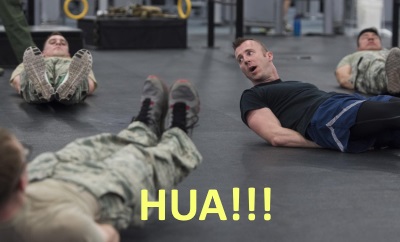
What’s The History Of HUA?
It’s unknown when HUA started, but some have speculated that it may have begun sometime during the Revolutionary war.
Various changes likely morphed through the War of 1812 all the way through to the Civil War.
It’s used in all aspects of Air Force recruit training, from Basic to Tech School.
HUA Example
Air Force MTI (E-5): “Get your butts to chow!”
Recruit: “HUA, sir!”
Hooah
Used by the United States Army, JROTC, and sometimes by the US Marine Corps and Navy Seabees.
Related Article: Marine Corps Age Limits
Hooah is used as a term for spirit and morale, generally meant to say anything and everything but “no.”
It’s also used, conversely, as a way to express excitement, approval, and even pleasure.
Used very frequently in Army Basic training as a way of acknowledging an order or instruction given by a drill instructor.
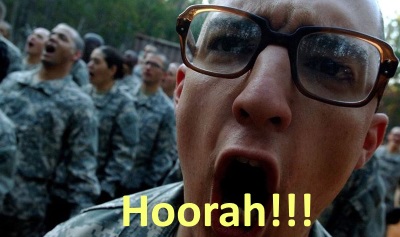
It’s an acronym is sort of similar to that of HUA, but can loosely be abbreviated by the acronym HURA.
HURA stands for “Heard, Understood, Recognized, and Acknowledged”.
Another common acronym is HURRAH, which originated from the German word hurra.
What’s The History Behind Hooah?
Unknown, but it likely formed around the same time as the others on this page. (ie the Revolutionary war)
Some wonder if it’s actually “Hooah” or “Oorah,” but you’ll never catch a Marine spelling it out as “Hoorah”.
Or anyone in the Air Force or Coast Guard, for that matter.
Hooah Example
Platoon Leader: “Platoon at attention! Barracks check in 5 min.!”
Platoon: “Hooah!”
Hoorah
- Pronounced ‘who-rah’
- Almost exclusively used by the Army
- Commonly used as a battle cry
It’s unknown where the term ‘hoorah’ originated, but it’s understood to be a variation of the more common “hooah.”
Oorah
Used almost exclusively by the United States Marine Corps.
Coined as a type of battle cry to be yelled during training or actual operations, can also be used as a term of agreeance with a statement made by someone.
Like a swarm of DIs.
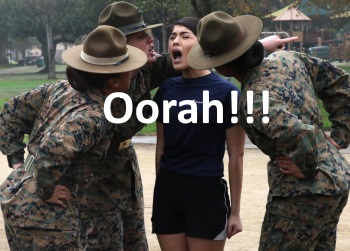
You’ll never hear an Army soldier uttering the phrase “Oorah,” unless he wanted his a$$ kicked.
One thing is for sure, Oorah is definitely a Marine thing!
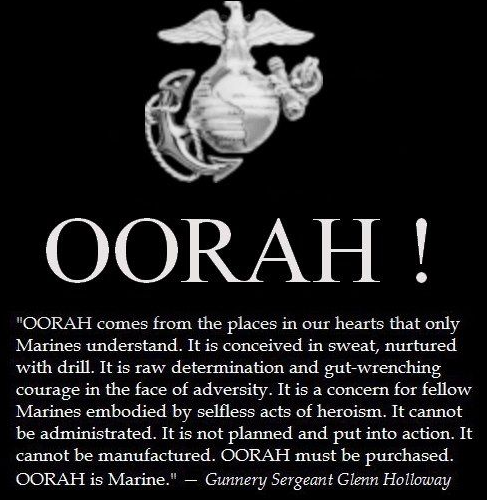
What’s The History Behind Oorah?
According to Wikipedia, Oorah may have been derived from the Ottoman Turkish phrase “vur ha,” which literally translates to “strike.”
Additionally, it’s possible that it started out as “Urakh,” which was a Mongolian word which means “forward.”
Other possible derivations of the word include:
- “Hurrah”
- “Hurray”
- “Hurra”
- “Hurree”
- “Hurren”
- “Huzzah”
A more recent claim is that Marines serving aboard submarines during the Korean war would hear the Klaxon horn go off.
It sounds like “awroogah!” which was then used by the Marines as a kind of motivational battle cry.
It, of course, has morphed since then into “Oorah”.
Oorah Example
Marine Gunnery Sgt.: “Let’s move out!”
Platoon: “Oorah!”
Hooyah
Used in the United States Navy. Like the others, it’s typically used as a term of acknowledgment or spirit of the Armed forces, the term is shared with the United States Coast Guard, which works in many different situations.
The term is very heavily used in Navy SEAL training (BUD/S), and if you ever make it to BUD/S, expect to say it about 500 times a day.
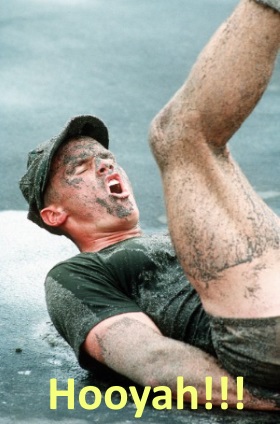
It sounds very similar to that of Hooah and Oorah, with the obvious missing of the Y in Yah.
It’s also used by the United States Coast Guard.
Other members of the Navy, including Hospital Corpsman and Masters-at-arms, also use the term frequently.
Interestingly enough, a common phrase being uttered by 1000s of people on the internet is “Can I get a Hooyah?!”
The original meaning and origination of that were made popular by Instagram star Alissa Violet, which was actually spelled out “Can I get a Hoya?”
Not “Hooyah”…
It has absolutely nothing to do with the Navy SEALs, or military in general.
What’s The History Of Hooyah?
Hooyah may have originated with the Underwater Demolition Teams (UDT) of World War 2.
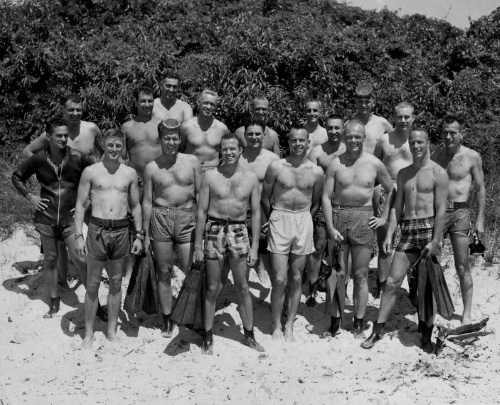
It was actually originally pronounced “Ooyah,” as in an affirmative “Ohhh yeeeaahh!” in response to an order from a Master Chief or other ranked individual.
Related Article: DEVGRU: Selection, Squadrons, Gear, Notable Missions, And More
Over time, it morphed into “Hooyah”.
Hooyah Example
Navy SEAL Platoon Chief: “Platoon, move out!”
SEAL Squad: “Hooyah!”
So What’s The Purpose Of All Of These?
Cadence
One of the purposes of military training is to teach people from different backgrounds a newfound discipline and skill.
Many people may come from a background that did not have a lot of structure or a team aspect, so they are less able to complete tasks when working with others.
One way to complete this task is by marching or running in a cadence.
A cadence is essentially something that can be said or yelled by members of a group in order for them to keep unity with each other.
Related Article – Navy SEAL Cadence: A List of the 10 Most Popular SEAL Running Cadences
“Jody”
Cadences have been used for years starting at the inception of the well-known sharp military marching.
Some individuals may call a cadence a “jody” and for a reason many people may not realize.
The jody that this term is referring to is a person who stays home while everyone else goes off to war. He or she gets to enjoy all the things the service member may be missing, more specifically, the girlfriend/boyfriend back at home while the service member is away on active duty.
Background
The military has had many different terms and traditions that are implemented and used over many years in order to strengthen camaraderie and morale while still allowing for the presence of strong military bearing.
Some things you may hear when around military personnel is the term “Hooah,” which differs from branch to branch.
The term can be heard in good or bad situations, as well as formal or informal settings. In the beginning, the term was used as an acronym (HUA) for “heard, understood, acknowledged” during briefings and a commander’s call to ensure troop spirit.
No matter the branch, the term is generally used in high morale, high spirit situations as a call of acknowledgment to a speaker or leader. When I was in Air Force basic training we used the term “HUA” during briefings and physical training.
Related Article – 5 Types Of Military Discharge: Benefits (and Consequences) Explained
Our military training instructor would require us to yell the term after the end of each set in a workout in order to add fun to the strenuous physical activity.
Sometimes the instructors would compete with each other to see whose group could say it louder as the workouts went on.
It was almost as if the louder you say it, the more you respected your instructor, and the more spirit you had in conducting the exercise.
I will definitely say no matter how tired you were throughout the workout, you definitely still had enough wind in you to yell it as loud as you could.
Differences
Just like other aspects of military culture, there is a different way of doing the same thing in each branch.
For instance, the chow or mess hall in the Army is the exact same thing as the dining facility in the Air Force.
The culture of each branch uses a different slang to the point where when you speak to others from different branches, you have to go in-depth about what you are talking about even though you are both in the Armed Forces and work together all the time.
So Now You Know The Difference Between Hoorah, Oorah, Hooah, And Hooyah…or at least you should…
As you can see, in most cases the term, no matter the flavor or slang that is put on it, either is a term of acknowledgment or spirit and morale. In light of spirit in morale just in case there is confusion. I will give a short example.
In a commander’s call in most branches (there may be different names for it) there is a time to give the unit awards or decorations.
Related Article: 6 Ways To Check If Someone Was In The Military
When a friend of yours or even someone from your unit is called, many different things are chanted in happiness for someone achieving something in their career.
On top of unit chants and other things, in most situations, it is acceptable to yell “Hoorah!” as loud as possible to show your appreciation and celebrate the time with them.
Frequently Asked Questions
What does it mean when an airman shouts “HUA!”
“HUA,” used almost exclusively by the U.S. Air Force, and stands for “Heard, understood, acknowledged.” It is sometimes used as a chant in a spirit of camaraderie.
Why do Marines shout “Hoorah”?
“Hoorah” is a battle cry used by the Marines since the mid-20th century and is now used frequently as a greeting between Marines.
What does a Marine mean when he shouts “Oorah”?
Like “Hoorah,” it’s a battle cry used during training or operations. This phrase is used almost exclusively by the Marine Corps.
What is the origin of the USMCs shouting “Oorah”?
The term may be from the Ottoman Turkish phrase, “Vur ha,” which means “to strike.” Or, it may be from “Urakh,” the Mongolian word for “Forward.”
What does “Hooah” mean in the Army?
Also used by other military branches, “Hooah” is a shout of enthusiasm to express enthusiasm and approval. It’s frequently used in Basic Training to acknowledge drill instructors.
Conclusion
In my personal opinion, the term is used as something you use often and loud in your younger years in the Armed Forces. As you gain rank and grow older, you still use the term but in a way to address whether or not your constituents understand what you are saying and copy.
To be completely honest, I think even if you don’t say the term back to someone speaking, they will most likely keep talking and won’t even notice you are not saying it back.
To each his own, no matter how or when it is used, it is just another term that makes the one percent of the United States population more unique.
Some may understand where we come from when it is said and some may not, as long as we understand and comply that is all that matters. Hoorah!
- Ikon Pass Military Discount: Learn How To Save Big - January 31, 2025
- RTIC Military Discount: Find Out How To Save Big on Gear - January 30, 2025
- Traeger Military Discount: Learn How To Save Big on Smokers - January 28, 2025

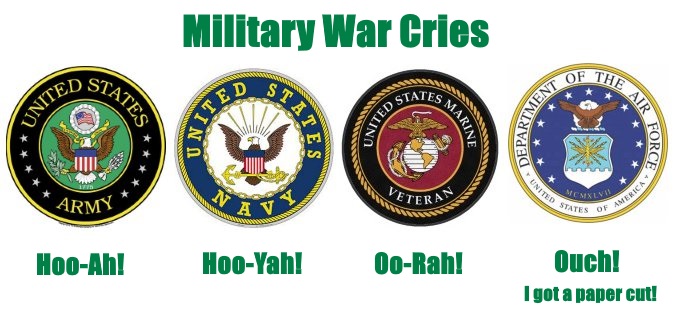




Hi, Mt name is Cinnie. My Husband now deceased, was in the Army, 36 1st. Aerial Weapons Company (Airmobile), 52d Aviation Battalion (Combat) Unit. He used to say Hoorah all the time. I was just checking on this site, where & what the meaning of the different branches. That say similar sayings and there meaning.



Thank You, for your interest in our Military.
I’m very sorry to hear that, Connie. God bless you, your husband, and our elite fighting military.
As former active army, its Hooah, not hoorah. Not sure where you got hoorah for the army from
Changed, thanks for that David.
Just curious why a photo of the Mercury astronauts would be captioned as a UDT team?
UDT Teams were involved in the recovery of astronauts after they splashed down in the ocean. In the photo, there are astronauts AND members of UDT-21.